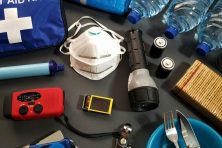My Family Lives Off One Income After I Had to Leave My Job. Here’s How We Budget on a $25,000 Salary

Sometimes, no matter how hard you try, it’s impossible to be completely prepared.
My family of three had no debt. We were saving money and felt pretty good about our financial situation. Then I was hit with anxiety and depression.
After the worst of the anxiety attacks, my husband and I decided I needed to quit my part-time job to stay home with our son. In doing so, we would lose about $10,000 a year.
I started reading all the books we’d been given on money and researching money management online. I’ve been a stay-at-home mom for four months now.
Here’s how we’re making it work.
We Save on Our Grocery Bill
Food was the one category I did not want to cut back on. Before I left my job, my family was working on eating healthier, and it was important to me that we continued to eat well.
So, instead of focusing on cutting spending, I chose to focus on cutting waste. Steve and Annette Economides suggest making a meal plan and only shopping once a month in their book “America’s Cheapest Family Gets You Right on the Money.”
We don’t have enough room for that much food storage in our apartment, so I cut our grocery shopping to every two weeks from once a week or more. I also started buying groceries in cash. This forced me to be more conscientious about what I purchased.
In one month, our grocery bill went from $300 to $150.
We Cut Back on Going Out to Eat
Our plan is to only eat out when we have money from donating plasma. In a good month we might get $200, but sometimes, like this last October, we got about $50.
I try to make sure we always have at least one meal’s worth of leftovers in the fridge for days when I just don’t have the energy to cook. However, with my depression, some days it’s too much to even warm up food in the microwave.
Now that my medication is starting to work, I’ve found a little push is sometimes all I need.
My “little push” is an index card I put on the fridge that says, “Today I decide to be wealthy.” I put it up after reading Richard Paul Evans’ “The 5 Lessons a Millionaire Taught Me.” He says to put the card somewhere you’ll see it every day.
I’ve found it most helpful to put it in a place where I’m most tempted to spend money. While we haven’t reached our goal yet, our restaurant bill went from $280 a month to about $150.
Each month we do a little better, and hopefully it will soon be $20 or less.
We Curbed Our Impulse Spending
We cut our impulse spending by accident. Months before I stopped working, I was telling my mom I couldn’t keep up with the cleaning and tidying of our home. She sent me “The Life-Changing Magic of Tidying Up” by Marie Kondo.
After reading it, I decided to follow her instructions and go through the entire house in one sitting. I made my wonderful husband read parts of the book so he could participate, too.
After we donated 10 large boxes and threw out five huge garbage bags of trash, we suddenly lost the desire to buy more stuff. Now when we buy things, it’s because it’s something we would really like to own or something we need.
Our impulse spending went from around $70 a month to an average of $10.
We Created an Emergency Fund
One of my biggest worries about leaving work was how we would afford an emergency without my income.
After reading “The Total Money Makeover” by Dave Ramsey, I decided we needed $1,000 in emergency money. And it needed to be a priority, just as Ramsey suggests.
When I made our budget in the past, I always went through all our expenses and put whatever was leftover in savings. Now we put 10% of every paycheck straight into savings and work with what we have left. When we spend less than what we budget, that extra money goes straight into savings.
As a young couple with a growing family, $1,000 seemed like a lot of money. Then I started putting all of our money in one place.
It’s hard to realize how much money you actually have until it’s all in one spot. Just by closing two bank accounts, we were able to put $300 in the emergency fund in one week. We were able to save $900 in three months.
A large chunk of our emergency fund is in cash. It’s out of sight, so it’s easy not to spend it.
How We Manage to Save Money With Only One Income
It wasn’t until I left my job that I realized just how much money we were spending because I was working.
On the days I worked, I often bought breakfast and lunch. And we no longer buy gas every week because we don’t use the car every day anymore.
We thought we would have to give so much up moving down to one income, but we didn’t: We were able to cut more than $300 from our budget within the first month.
And, we can still afford to do fun things as a family because we use our time and money more wisely.
Stephanie Stewart is a public relations specialist and emergency dispatcher turned stay-at-home mom. She has a son and another child on the way, whom she is excited to be with at home.












